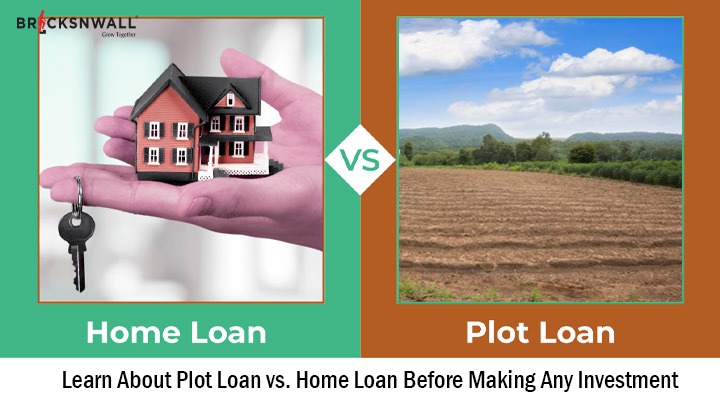Learn About Plot Loan vs. Home Loan Before Making Any Investment
Bricksnwall Trusted Experts

Buying a home is a major priority for many people.
While a home loan is a popular method of financing property purchases, many
people are unfamiliar with the subtleties of a land loan. Most people use the
terms house loan and land loan interchangeably, but they actually serve
different functions. To assist clear up any confusion, we'll explain the main
differences between a home loan and a land loan. This will offer you a better
notion of which form of loan you should get based on the criteria.
The difference between a home loan and a plot or
land loan
1. Purpose of the Loan
A home loan can be used to purchase a new or
pre-owned house, an under-construction house, or to build your own home. A land
loan, on the other hand, is available for purchasing a plot of land if it falls
within the municipal corporation limits and is one of the following:
Non-agricultural Land
Residential
Non-commercial
Not an industrial area.
Not located within the village.
With the assistance of prominent banks and other financial organizations, you can simply obtain a home or land loan through a simple loan application process.
2. Loan to Value Ratio (LTV)
The Loan to Value (LTV) Ratio is the loan amount
compared to the property's value. A home loan's LTV ratio can range between 75
and 90% of the property's worth, whereas a land loan's maximum LTV is limited
to 75 to 80% of the plot's value, depending on the loan amount. However, if you
require more funds to cover expenses such as house repair, extension, and so
on, you can apply for a top-up loan by contacting your lender. A top-up loan is
a financing option that is supplied in addition to your current loan amount.
3. Loan Tenure
Home loans have a longer tenure than land loans.
The longest tenure of a home loan is 20 years, whereas land loans are granted
for a maximum tenure of 15 years.
4. Tax benefits
Section 80C of the Income Tax Act allows you to deduct Rs 1.5 lakh on principal repayment. Furthermore, Section 24 allows a deduction of up to Rs 2 lakh on the interest payable. It should be emphasized that land loans do not qualify for any tax benefits. However, if you build a home on the purchased plot, you may be eligible for tax breaks on the amount spent on the building.
5. Eligibility Criteria
Home loans have lower eligibility requirements than
land loans. Any Indian resident aged 21 to 65, salaried or self-employed, who
meets the minimal income requirements, can easily obtain a home loan. It should
be noted that house loan eligibility criteria may vary slightly amongst lending
institutions. In the event of a land loan, lenders often grant the loan amount
only to borrowers who are certain of building a home on the purchased plot
within the stated time frame. Furthermore, for Non-Resident Indians (NRIs),
obtaining a land loan is significantly more complicated because of several
government rules.
6. Interest Rate
Lenders consider land loans to be riskier because it is difficult to determine the exact value of the piece. As a result, land loans have slightly higher interest rates than housing loans. Home loans are currently available at roughly 7.50% per year, while land loans range from 8% to 10% per year.
7. Documentation
The paperwork required to obtain a land loan and a home loan are the same. Some of the basic paperwork necessary are listed below:
- Loan application form.
- Passport-sized photo.
- Please provide proof of identity (passport,
PAN card, driving license), residence (Aadhaar card, electricity bill,
ration card), and bank account statement/passbook for the past 6 months.
- Salary Certificate from the Employer.
- Form 16/IT Returns over the last two fiscal
years.
- To summarise, a home loan is preferable if you want to buy an apartment or an under-construction property, whereas a land loan is required if you want to build your own home by acquiring a plot. Regardless of the sort of loan you choose, make sure to read the terms and conditions thoroughly before signing the loan agreement.
Features of the land loan and plot loan
When considering a plot loan, it's crucial to remember the following qualities and requirements:
- The property must be situated inside the boundaries of a corporation or municipality, not in an industrial or village area. This is because lenders consider urban assets to be a safer option for land purchases.
- It is crucial to understand that land financing
cannot be utilized to purchase agricultural land. This is because
agricultural land is frequently regarded as a riskier investment due to
its reliance on variables such as weather and government laws.
- If you take out a house loan to build a property on the plot, you may be eligible for a plot loan tax break, but only after the construction is finished.
- A land loan's lifespan varies, but it can last up to 15 years, providing you plenty of time to repay the loan.
- Depending on the lender, you may be able to use the bank loan to buy land via direct allotment or resale plots. This flexibility is especially beneficial if you're seeking for a specific sort of land or location.
Similarities Between Plot Loan and Home Loan
A home and plot loan goes through a similar due
diligence process during the application stage, regardless of the type of loan
sought for. In addition, lenders frequently offer equivalent EMI (equated
monthly installment) alternatives and co-applicant requirements for both types
of land financing.
A co-applicant can be a spouse, family member, or anyone willing to share loan liability. Having a co-applicant with a solid credit score and stable income might increase your chances of loan approval and result in a reduced interest rate.







